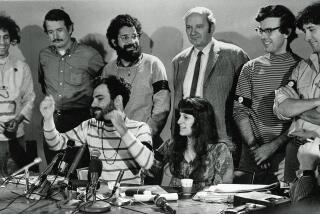Abbie Hoffman: The Yippie Who Stayed in Tune With ‘60s
- Share via
John Froines hadn’t seen much of Abbie Hoffman over the last few years. But they were thrown together nearly 20 years ago as members of the famous Chicago Seven who underwent a raucous 4 1/2-month trial stemming from street protests at the 1968 Democratic convention. And that often hard and bitter courtroom drama left Froines with an enduring fondness for the wild-haired counterculture guerrilla and Yippie leader who died Wednesday at age 52.
“You talk about great people and you think of John Kennedy or Winston Churchill,” Froines, now a member of the public health faculty at UCLA, said Thursday. “But I think that with Abbie we’ve lost somebody who’s very precious.”
Froines feelings were echoed by other Hoffman friends as they reminisced about the life of a man who delighted in questioning authority--and making fun of it.
Paul Krassner, who now lives in Venice but helped Hoffman found the Youth International Party in New York in late 1967, said he hoped that Hoffman will be remembered for his commitment to justice and reform.
“I think it’s important for young people to know that there are creative ways of fighting city hall, which is what Abbie stood for,” said Krassner, perhaps best known for the alternative magazine and newsletter--The Realist--that he has published since 1958. Krassner was not arrested or tried following the 1968 demonstrations in Chicago.
Krassner said the enduring lesson he learned from Hoffman was about the pervasive nature of politics. “Politics and culture are the same,” he explained. “Our culture was our politics; you couldn’t separate them.”
California Assemblyman Tom Hayden, another of the defendants in the Chicago Seven case, issued a statement through his office about Hoffman’s passing.
“I am shocked and profoundly saddened by Abbie Hoffman’s death. He was an important person of my generation and he will be dearly missed,” Hayden’s statement said.
But not everyone was so effusive about Hoffman’s often controversial political activism, especially those who were in positions to put his career in perspective. Said Mark Kann, a professor of political science at USC who was active in the anti-war movement but not a member of the Chicago Seven, “I think the ‘60s had some real impact on our society. Whether Abbie Hoffman had much impact I think is questionable. To me he represented this relatively small group that was terrific at getting publicity.”
‘Serious Doubts’
By doing “outrageous things,” Kann said, Hoffman was “effective for a short while” at raising questions that needed to be raised. Did Hoffman and the Yippies provide answers to those questions? “I have serious doubts about that.”
Others who were on trial with Hoffman could not be reached for comment. At last report, former Yippie leader Jerry Rubin was running a New York company that produces parties for yuppies at Manhattan nightclubs. Lee Weiner is a consultant who operates a direct mail firm for nonprofit organizations and political clients from Washington, D.C. Rennie Davis reportedly still lives in the Denver area where he once sold life insurance. David Dellinger, a lifelong peace activist, is in his early 70s and lives in Peacham, Vt. Black Panther Bobby Seale, whose case was severed from the others and tried separately, works at Temple University in Philadelphia where he is doing graduate study in political science and African-American studies.
Psychedelic drug guru Timothy Leary, who helped set the tone for the 1960s, offered a comment that placed Hoffman in a pantheon of heroes and anti-heroes.
“Abbie Hoffman was an American legend. He was up there in the hall of fame with rebel Huck Finn, rowdy Babe Ruth, crazy Lenny Bruce,” Leary told the Associated Press. “He was the Pete Rose of the ‘60s counterculture, a hustler, a base stealer, a wild free spirit and a gambler. He is a historic figure and a great American and I loved the guy.”
A ‘Serious Social Critic’
Paul Von Blum, a lecturer at UCLA since 1980 and a friend of Krassner who was involved early on in the nonviolent civil rights movement, said, “For all his image as a kind of buffoon and clown, I think Abbie Hoffman was a very serious social critic in the historical grain of American social critics. There is an entire generation of academics and others who are his moral legacy.”
Hoffman gained national attention as a member of the Chicago Seven, a group of radicals who led hundreds of protesters at the 1968 Democratic National Convention in Chicago. They were later charged with conspiracy to incite violence at the convention. The defendants, particularly Hoffman and Rubin, turned the court into a theater with antics that included wearing judicial robes to court, taking them off and stomping on them.
Krassner said that though Hoffman’s fortunes waxed and waned he remained committed to his brand of politics, which mixed activism with humor. “Abbie, if he had chose to, could have been a very successful political satirist,” he said.
Hoffman was reported to be suffering lingering pain from an automobile accident and to have been depressed just before he was found dead by his landlord in his Pennsylvania apartment. One report described Hoffman’s residence as a converted chicken coop.
At the time of his death, Krassner said, Hoffman was working with a co-author on a book about political campaigns as well as continuing to speak on the lecture circuit.
As recently as last week, Hoffman traveled to Vanderbilt University in Nashville, Tenn., where he participated in a panel discussion with other ‘60s activists.
There Hoffman criticized today’s campuses as “bastions of rest,” and said the interest young people have in the ‘60s disturbed him.
“Nostalgia is a sign of middle-age,” he said before his Vanderbilt appearance. “We’re reminiscing about our youth. When you see young people nostalgic for a youth they didn’t even experience, it’s a little sad. They’re supposed to be out making one for themselves.”
Times Staff Writer Beverly Beyette contributed to this story.
More to Read
Sign up for Essential California
The most important California stories and recommendations in your inbox every morning.
You may occasionally receive promotional content from the Los Angeles Times.













